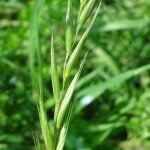| Common Name: |
Quack Grass |
| Other Names: |
Twitch, couch grass |
| Botanical Name: |
Agropyron repens syn. Elymus repens |
| Genus: |
Agropyron |
| Family: |
Poaceae |
| Native Location: |
Europe, N Africa, Siberia, N America |
| Cultivation: |
Most soils in sun or shade. Light, sandy soils give highes yields of rhizomes. Agropyron repens is extremely invasive and difficult to eradicate. It should be grown in containers and not allowed to seed. |
| Propagation: |
By division in autumn or spring |
| Harvest: |
Rhizomes are dug in spring and used fresh in homeopathic preparations, or cut into 5cm (2in) sections, and dried below 30°C (86°F) for use in decoctions, liquid extracts, and tinctures. |
| Height: |
30cm-1m (1-3ft) |
| :Width |
Indefinite |
| Hardiness: |
Z3-9 |
| Parts Used: |
Rhizomes |
| Properties: |
A soothing herb that improves excretion from kidneys and bowels, lowers cholesterol levels, and clears infection. |
| Medicinal Uses: |
Internally for kidney and bladder complaints (especially enlarged prostate and cystitis), gout, and rheumatism. Combines well with Agathosma spp. (see oval-leaf buchu) for cystitis and Hydrangea arborescens (see wild hydrangea) for prostatitis. |
| Bibliography: |
Encylopedia of Herbs by Deni Brown Copyright ©: 1995, 2001 Dorling Kindersley Limited pp 107, 201
|

